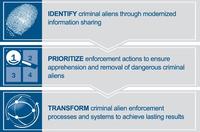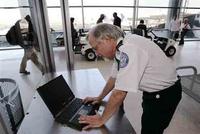-
DHS unveils new Maritime security strategy
Earlier this month DHS unveiled its Maritime Operations Coordination plan designed to more efficiently secure the nation’s coastlines by increasing coordination and information sharing among agencies; the new operation plans works to integrate intelligence sharing between the Coast Guard, Customs and Border Protection (CBP), and Immigration and Customs Enforcement (ICE)
-
-
Heathrow deploys face-recognition scanners

Heathrow Airport is deploying facial recognition scanners at two of the airport’s terminals; the technology aims to help prevent a scenario in which an international passenger swaps tickets with a domestic passenger in the departure lounge
-
-
Immigration and the Aussie resources boom
Australian businesses claim that unless overseas migration into Australia is kept at 180,000 people a year or higher, there will not be enough skilled workers to meet employer requirements and to sustain the country’s aggregate economic growth; a new study challenges many of the assumptions reinforcing the arguments for continued high levels of immigration, and shows that Australia’s economic growth can be maintained with overseas migration at 90,000 people a year
-
-
Dramatic increase in Indians entering U.S. illegally

There has been a dramatic decrease in the past three years in illegal immigration into the United States — but the same years saw a dramatic increase in illegal immigration from one country: India; in May, DHS secretary Janet Napolitano told a Senate committee that at some point this year, Indians will account for about 1 in 3 non-Mexican illegal immigrants caught in Texas; experts say that at least one reason is that, beginning in 2009, Guatemala, El Salvador, Honduras, and Nicaragua no longer require Indians to obtain a visa before entering any of the four Central American countries, making it easier for smugglers to bring Indians there, and from there to the United States
-
-
Senators concerned about terrorists entering U.S.
U.S. lawmakers have lingering concerns about the ability for terrorists to enter the country following last week’s Senate hearing that investigated how two Iraqi nationals with terrorist ties were able to enter the United States and live in Bowling Green, Kentucky for several years; A Government Accountability Report (GAO), released on the same day as the hearing, found four critical gaps in preventing terrorists from entering the United States
-
-
Sector Report for Thursday, 14 July 2011: Border / Immigration control
This report contains the following stories.
Plus 1 additional story.
-
-
Judge orders DHS to clarify whether Secure Communities is mandatory

On Monday, a New York judge ordered federal immigration officials to provide clarification on whether or not states and local law enforcement agencies had the ability to opt out of the controversial Secure Communities immigration enforcement program; the judge’s ruling comes as part of a Freedom of Information Act lawsuit launched by several immigration and legal rights groups
-
-
Texas gets second UAV
Border agents in south Texas will be getting additional help thanks to the deployment of a second unmanned aerial vehicle (UAV) in the area; currently there are four UAVs deployed along the U.S.-Mexico border and three of them are based in Arizona; the second drone is expected to arrive later this year or in the early part of next year.
-
-
Tough new Alabama immigration law divides community
A sweeping new Alabama immigration law is generating sharp controversy and unease with many likening it to a return to the state’s brutal Jim Crow laws; among the strict immigration measures passed last month, undocumented immigrants are banned from enrolling in or attending college, applying for work, and landlords are restricted from renting property to illegal aliens; the law even requires school districts to check the immigration status of children; the bill has drawn fierce criticism from immigration advocates, churches, and civil liberties groups.
-
-
Senator Schumer demands release of northern counternarcotics strategy
Senator Charles Schumer (D-New York) is demanding that the Office of National Drug Control Policy (ONDCP) release its Northern Border Counternarcotics strategy immediately; the strategy was due on 5 July as stipulated by a law passed in January; the law came in response to a to a Government Accountability Office (GAO) report which found that only thirty-two miles along the nearly 4,000 mile U.S.-Canada border had “an acceptable level of security”
-
-
Boston threatens to withdraw from Secure Communities
On Monday Boston mayor Thomas M. Menino announced that he will withdraw the city from the controversial Secure Communities program unless changes are made; Boston was among the first cities in the United States to test the program in 2006, but now Mayor Menino is one of the many growing voices that have taken aim at the Secure Communities program
-
-
More than forty dead in Mexico in a weekend of violence
Over the weekend more than twenty people were killed in a hail of bullets in Monterrey, Mexico; last Friday gunmen open fired on a bar indiscriminately killing patrons and even the hot dog vendor outside; in a weekend filled with violence, eleven bodies with gunshot wounds were found on the outskirts of Mexico City and ten decapitated heads were found in Torreon
-
-
Can DHS seize -- and hold for months -- U.S. citizens' laptops?

On Friday, a federal judge heard arguments in a lawsuit that challenged the government’s right to search laptops, cell phones, and other electronic devices at the border and hold them indefinitely; civil liberties groups say the policy violates a travelers’ First Amendment right to free speech and the Fourth Amendment’s protection from unreasonable search and seizure; according to the civil liberties groups, more than 6,500 travelers have been subject to such search and seizure of their electronic devices from October 2008 to June 2010
-
-
North Carolina jail investigated for immigration violations
A jail in North Carolina is currently under federal investigation on charges that local law officers mistreated detainees held as part of an immigration enforcement program; the investigation comes at the request of the state’s American Civil Liberties Union (ACLU) which requested that DHS officials investigate the Wake County jail based on fifty-seven complaints made by individuals detained there in 2009 and 2010; the complaints stem from the 287(g) program which allows local police officers to enforce federal immigration laws
-
-
Sector Report for Thursday, 30 June 2011: Border / Immigration control
This report contains the following stories.
Plus 1 additional story.
-
- All
- Regional
- Water
- Biometrics
- Borders/Immig
- Business
- Cybersecurity
- Detection
- Disasters
- Government
- Infrastructure
- International
- Public health
- Public Safety
- Communication interoperabillity
- Emergency services
- Emergency medical services
- Fire
- First response
- IEDs
- Law Enforcement
- Law Enforcement Technology
- Military technology
- Nonlethal weapons
- Nuclear weapons
- Personal protection equipment
- Police
- Notification /alert systems
- Situational awareness
- Weapons systems
- Sci-Tech
- Sector Reports
- Surveillance
- Transportation
Advertising & Marketing: advertise@newswirepubs.com
Editorial: editor@newswirepubs.com
General: info@newswirepubs.com
2010-2011 © News Wire Publications, LLC News Wire Publications, LLC
220 Old Country Road | Suite 200 | Mineola | New York | 11501
Permissions and Policies
Editorial: editor@newswirepubs.com
General: info@newswirepubs.com
2010-2011 © News Wire Publications, LLC News Wire Publications, LLC
220 Old Country Road | Suite 200 | Mineola | New York | 11501
Permissions and Policies
